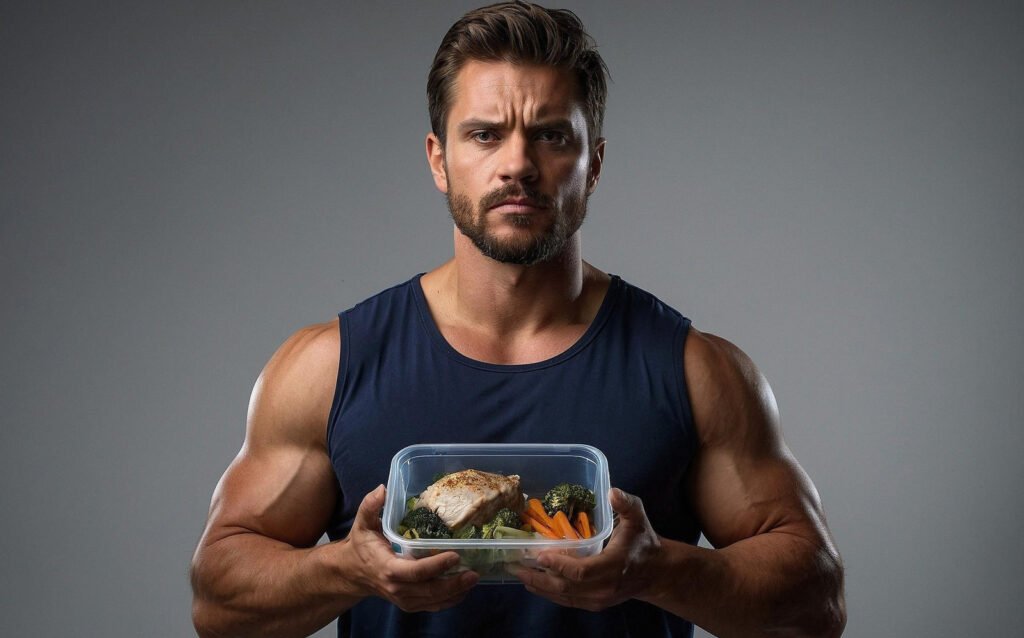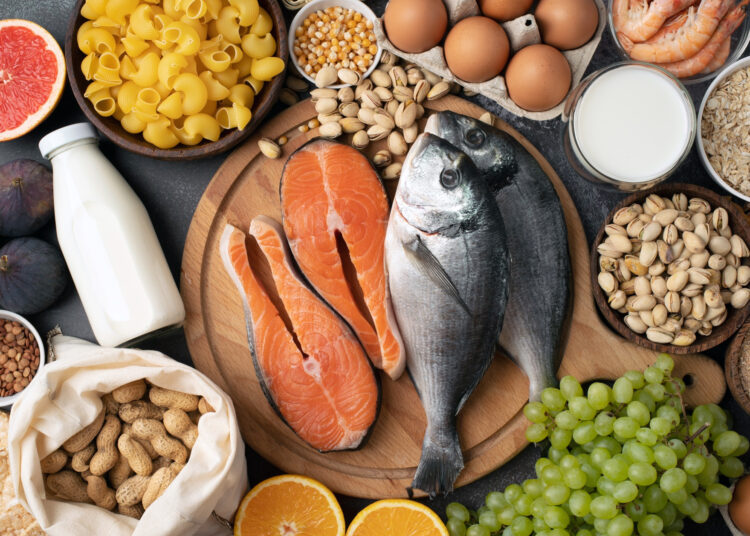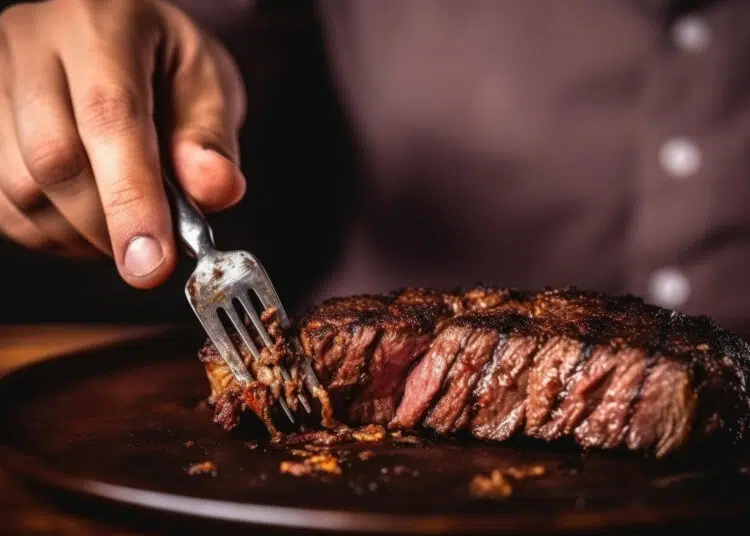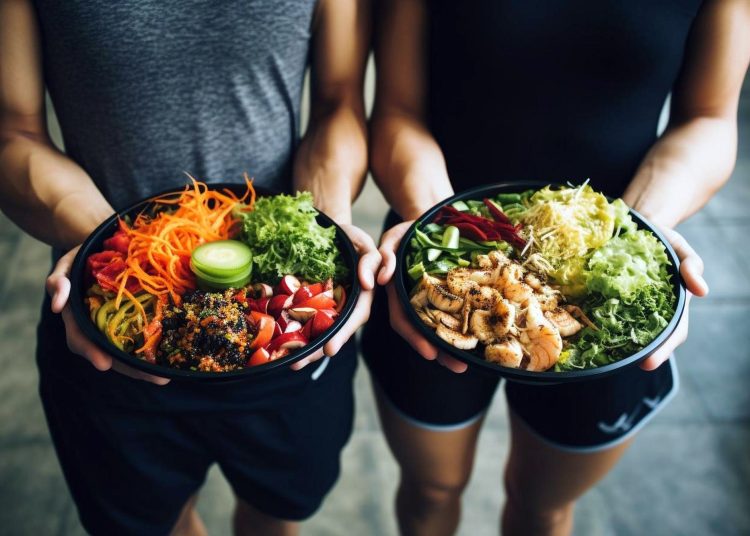
Maximising your fitness and transformation potential requires mastering every aspect of your lifestyle, from training to diet and recovery.
With time, most lifters start experimenting with different meal plans and try to time their nutrient intake for optimal anabolic response. This is known as nutrient timing and mainly involves consuming carbs and protein at strategic times around your workouts.
Chances are that you’ve already been made to believe by swole dudes in your gym that your workout is wasted if you don’t eat protein within 30 minutes of your last rep.
This makes people try all sorts of carb and protein recipes to find the perfect balance of taste and results. However, switching between different carb and protein combos like a madman creates more stress than strength, which can be counterproductive for your fitness goals.
As a personal trainer with over 17 years in the trenches, I’ve tried hundreds of post-workout meal combos. In this article, I’ll share two straightforward recipes that have helped many of my clients optimize their recovery and gains. We have a lot to unpack, so sit tight and read on.
Why Nutrient Timing Matters for Recovery


Our bodies use stored glycogen (converted from carbs) as their primary fuel source to power our physical and mental functions. Research shows that an intense training session can deplete your glycogen stores by 24 to 40 percent, which is substantial. (1)
Level Up Your Fitness: Join our 💪 strong community in Fitness Volt Newsletter. Get daily inspiration, expert-backed workouts, nutrition tips, the latest in strength sports, and the support you need to reach your goals. Subscribe for free!
Please wait…
Low glycogen levels can leave you sluggish.
Eating the right foods after a session can accelerate glycogen replenishment and restore energy levels exhausted during your workouts. This can boost recovery and significantly limit delayed onset muscle soreness (DOMS).
An improved recovery limits the downtime between workouts, empowering you to give your best in each session.
It doesn’t end there.
The right protein-carb combo can also kickstart muscle protein synthesis, repairing and building the fibers you damaged during your workout. Not eating enough protein and amino acids after your workouts can put you in a catabolic state, where your body breaks down muscle tissue to use as fuel.
So, irrespective of how hard you train, you cannot achieve your desired results until you eat right and give your muscles enough time to rest and recover.
Timing your carbs and protein can supercharge your gains. But how is that, you ask?
Carbs can spike your insulin levels, a hormone that shuttles glucose into muscles to restock the lost glycogen. Pair this with protein, and the amino acids will ignite muscle protein synthesis. This is a double whammy, if you ask me.
The Ideal Carb-Protein Combo: What to Eat

Now that you understand how timing your protein and carb intake can help boost your results, let’s talk about how much of these macronutrients you need to maximize adaptations.
The Golden Ratio: 3:1 or 4:1 Carbs To Protein
Maximizing your results is a balancing act. You must not only aim for equilibrium in your diet, training, and rest, but also fine-tune your carb and protein intake to put your body in a conducive environment to maximize hypertrophy and strength gains.
Aim for a 3:1 or 4:1 carbs-to-protein ratio, as a study concludes that 60 grams of carbs and 20 grams of protein restored glycogen 30 percent faster than consuming carbs alone. (2)
Sticking with this can be a game-changer, whether you are training to build muscle and strength or enhance your endurance and stamina.
That said, each individual is unique, and your ideal carb, protein, and fat intake can vary depending on factors like age, gender, training experience, and objectives. As a rule of thumb, you should eat anywhere between 0.8-1.6 grams of protein per kilogram of body weight to maximize hypertrophy.
Experts believe that muscles act like sponges after a training session and soak up all the nutrients you give them shortly after a workout. Use this window to ensure you are getting the best bang for your training buck.
Protein and Carb Sources
No two food sources are exactly the same. You want easily digestible options that hit your bloodstream fast and don’t cause negative effects like lethargy or subsequent energy crashes.
When it comes to carbs, opt for complex sources like white rice, starchy vegetables, and legumes, and avoid simple carbs as they tend to cause blood sugar level spikes and plateaus. You must avoid slow-digesting carbs like whole grains right after training. These might be great for breakfast, as they deliver consistent energy throughout the day, but you need food sources that deliver quick glycogen replenishment after an intense session.
Whey protein is the ultimate champ when we talk about post-training nutrition. Lifters have been gulping delicious protein shakes after their workout session for a very long time, and the results speak for themselves.
I also recommend fish to my clients as it is a quick-digesting source of protein and will kickstart recovery without making you feel bloated and heavy.
Chicken breast and pea and hemp protein powders are other popular high-protein options that you can consider.
At the same time, you must avoid going overboard with your protein intake. Since protein has earned itself a reputation in the lifting circles, many people drink multiple scoops of protein powder daily, hoping for quick results. However, you must understand that your body can only digest up to 50 grams of protein at once. The rest is excreted from the body in the form of waste.
Sample Carb-Protein Meal Ideas For Optimal Recovery

Level Up Your Fitness: Join our 💪 strong community in Fitness Volt Newsletter. Get daily inspiration, expert-backed workouts, nutrition tips, the latest in strength sports, and the support you need to reach your goals. Subscribe for free!
Please wait…
When it comes to post-training nutrition, convenience and versatility are just as important as the exact nutrient content. For instance, most people consume this meal while they are on the move. Recommending a heavy meal that you must sit down to eat at this time would be impractical.
Protein and Carb Shake
You leave gains on the table by drinking a vanilla protein shake after a workout. I recommend blending 25 grams of whey protein powder with one banana (30 grams of carbs) and a quarter cup of oats (15 grams of carbs) to fuel your muscles optimally.
This meal is quick, portable, and satisfies the 3:1 carbs-to-protein ratio.
Good Old Bodybuilding Meal
Elite bodybuilders like the eight-time Mr. Olympia champ Ronnie Coleman ate this meal during his prime, and the results speak for themselves.
This recipe is incredibly easy and doesn’t take a lot of time to cook. Pair four ounces of grilled chicken breast (20 grams of protein) with three-fourths of a cup of white rice (45 grams of carbs) and a tablespoon of honey (15 grams of carbs).
Use your favorite zero-calorie seasonings and condiments to make it taste delicious. This lip-smacking meal will satisfy your hunger and keep you feeling full for a long time.
Common Mistakes to Avoid

As someone who spends most of their day in the gym, I see several people make the same post-workout meal disasters that hamper their progress.
Delaying Post-Workout Nutrition
A study published in the Journal of the International Society of Sports Nutrition concluded that consuming adequate protein throughout the day is more important than timing it around your workouts. (3)
The same is true for carb intake. However, eating complex carbs before the workout gives you enough energy to power intense sessions. Plus, consuming the right carb sources after training replenishes your glycogen stores, supporting recovery.
I would also like to point out that some lifters cite this research and completely overlook their post-training nutrition, which is a blunder.
Just because there are no additional benefits of consuming a protein and carb-rich meal within the ‘anabolic window’ doesn’t mean there is something wrong with it, and you should avoid it. You must keep yourself fed optimally throughout the day to maximize adaptations.
While I can understand that eating right after finishing the final set of your workout might not be practical (or comfortable) sometimes, you must strive to consume a protein and carb-rich meal within an hour of the session.
Focusing on Protein, Skimping on Carbs

Although protein is the building block of muscle, you cannot overlook the role of carbohydrates when it comes to post-training recovery.
Carbs spike insulin levels, which shuttle glucose throughout your body to replenish glycogen and help with protein absorption. If you’re consuming 20 grams of protein post-workout, you need 60 grams of carbs to maximize its absorption (3:1 ratio).
Falling For the Wrong Type of Carbs
Sweet potatoes’ popularity in fitness circles is growing with each passing day. I see several people carry them in Tupperware to the gym and eat them after their training session.
Sweet potatoes aren’t the most optimal post-workout food sources as they have a low to moderate glycemic index (depending on how they’re cooked). This means they raise blood sugar gradually, delaying glycogen replenishment.
Always opt for fast carbs like white rice and dextrose supplements for quick glycogen restoration. Also, avoid high-fiber foods as they can also slow down digestion and nutrient absorption.
Practical Tips for Implementation

Work, gym session, and post-workout meals don’t always play nice. Use the following hacks to keep your body fueled and optimize recovery:
- Meal prep: Use your day off from work to prepare a week’s worth of meals in advance. This limits the risk of feeding on junk food when you are starving and don’t have anything healthy to eat at hand. Since the two high-carb and protein meals are incredibly easy to make, it won’t take you more than 30 minutes to get everything done.
- On-the-go options: Eating chicken breast and white rice daily can get boring quickly. Plus, there might be days when you don’t have time to prep the meals. A protein bar and a banana can come in handy in these situations.
- Adjust for your workouts: You shouldn’t stick to 60 grams of carbs and 20 grams of protein for all your training sessions. A 50 and 20 carb-protein split would suffice if your workouts aren’t that intense.
Adaptability is incredibly important when it comes to carving the physique of your dreams. Be flexible and innovative, and adjust your post-training diet according to the impending situation. This is the holy grail for avoiding plateaus.
Things To Consider
With all that said and done, you must remember that achieving your dream physique involves much more than eating carbs and protein at specific times during the day.
Progressive overload is the name of the game when it comes to ensuring consistent progress in the gym. It involves gradually increasing the demand on your muscles by using heavier weights, doing more reps and sets, or employing advanced training techniques like supersets and dropsets.
Besides meeting your daily macro and micronutrient needs, you must also drink at least a gallon of water daily to prevent the risk of dehydration and the health issues that come with it. You can also add a calorie-free electrolyte supp to the water to replenish essential minerals along with the lost water.
Finally, sleep for at least eight hours each night to give your muscles enough time to rest and recover.
Note: The content on Fitness Volt is for informative purposes only. Do not take it as medical advice to diagnose, prevent, or treat health problems. If you’re suffering from a health issue, are pregnant, or are under 18 years old, you should consult your physician before starting any new supplement, nutrition, or fitness routine.
Conclusion
Most people overthink their post-training nutrition. They try to overoptimize and end up doing more harm than good. The carb and protein shake and old-school bodybuilding recipes detailed above kickstart glycogen replenishment and muscle protein synthesis.
Feel free to tweak these post-workout meals according to your unique taste and nutrient goals. Make them a staple in your fitness routine, and you’ll achieve your goals in no time. Best of luck!
References:
Fitness Volt is committed to providing our readers with science-based information. We use only credible and peer-reviewed sources to support the information we share in our articles.
- Knuiman P, Hopman MT, Mensink M. Glycogen availability and skeletal muscle adaptations with endurance and resistance exercise. Nutr Metab (Lond). 2015 Dec 21;12:59. doi: 10.1186/s12986-015-0055-9. PMID: 26697098; PMCID: PMC4687103.
- Kerksick C, Harvey T, Stout J, Campbell B, Wilborn C, Kreider R, Kalman D, Ziegenfuss T, Lopez H, Landis J, Ivy JL, Antonio J. International Society of Sports Nutrition position stand: nutrient timing. J Int Soc Sports Nutr. 2008 Oct 3;5:17. doi: 10.1186/1550-2783-5-17. Erratum in: J Int Soc Sports Nutr. 2008;5:18. PMID: 18834505; PMCID: PMC2575187.
- Schoenfeld BJ, Aragon AA, Krieger JW. The effect of protein timing on muscle strength and hypertrophy: a meta-analysis. J Int Soc Sports Nutr. 2013 Dec 3;10(1):53. doi: 10.1186/1550-2783-10-53. PMID: 24299050; PMCID: PMC3879660.







